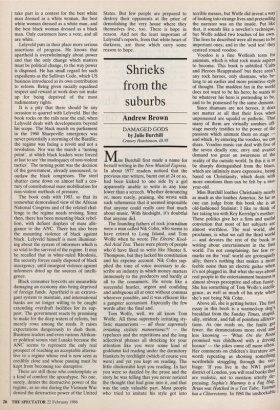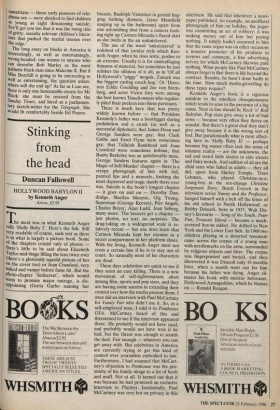Shrieks from the suburbs
Andrew Brown
DAMAGED GODS by Julie Burchill Century Hutchinson, f8.95 Miss Burchill first made a name for herself writing in the New Musical Express. In about 1977 readers noticed that the previous star writers, burnt out at 24 or so, had been kicked to one side by a girl apparently unable to write in any tone lower than a screech. Whether denouncing or, more rarely, praising, she wrote with such vehemence that it seemed impossible that anyone could really care that much about music. With hindsight, it's doubtful that anyone did.
The founding fathers of rock journalism were a man called Nik Cohn, who seems to have retired to Long Island, and Tom Wolfe when he wrote The Electric Kool- Aid Acid Test. There were plenty of people who'd have liked to write like Hunter S. Thompson, but they lacked his constitution and his expense account. Nik Cohn sup- plied the tone of voice necessary to de- scribe an industry in which money matters immensely to the producers and hardly at all to the consumers. He wrote like a successful hustler, urgent and confiding and ambiguous all at once without commas wherever possible, and it was efficient like a gangster accountant. Especially the few words after the final and.
Tom Wolfe, well, we all know Tom Wolfe. All those supremely irritating sty- listic mannerisms — all those supremely irritating stylistic mannerisms!!! — the typefaces and the repetitions and the long adjectival phrases all shrieking for your attention like you were some kind of goddamn kid reading under the dormitory blankets by torchlight (which of course you were) and yet you kept on reading. The little chickenshit kept you reading. In fact you were so dazzled by the prose and the story he was telling that you never noticed the thought that had gone into it, and that was the only valuable part. Most people who tried to imitate his style got into terrible messes, but Wolfe did invent a way of looking into strange lives and pretending the narrator was on the inside. Put like that, it sounds like a novelist's technique, but Wolfe added two touches of his own. The lives he described were all meant to be important ones; and in the 'acid test' they centred round voodoo.
Voodoo is a fine Wolfeish term for animism, which is what rock music aspires to become. This book is subtitled 'Cults and Heroes Reappraised' but there aren't any rock heroes, only shamans, who be- long to an earlier and more primitive style of thought. The maddest fan in the world does not want to be his hero; he wants to be whatever his hero is pretending to be, and to be possessed by the same demons. Since shamans are not heroes, it does not matter at all that their lives when unpossessed are squalid or pathetic. That many of them are virtually zombies off- stage merely testifies to the power of the passions which animate them on stage and which, by entering the voodoo, we can share. Voodoo music can deal with five of the seven deadly sins; envy and avarice demand too great an awareness of the reality of the outside world. In this it is to be sharply distinguished from the blues, which are infinitely more expressive, being based on Christianity, which deals with more emotions than can be felt by a two- year-old.
Miss Burchill loathes Christianity nearlY as much as she loathes America. So far as one can judge from this book she is an old-fashioned Stalinist: I like to think of her taking tea with Roy Kerridge's mother. These politics give her a firm and useful conviction that most of her subjects are almost worthless. The real world, she proclaims, is what we call the third world and devotes the rest of the book to writing about entertainment in the first world. I'm not complaining: her few re- marks on the 'real' world are grotesquely silly; there's nothing that makes a more feeble noise than an electric guitar when it's not plugged in. But what she says about real people in the entertainment business is almost always perceptive and often funny. She has something of Tom Wolfe's intelli- gence, as well as much of his style when she's not being Nik Cohn. Above all, she is getting better. The first essay in this book is a warmed-up dog's breakfast from the Sunday Times, stupid, silly, strident, and full of pointless allitera- tions. As one reads on, the faults get fewer, the denunciations more vivid and less knowing — 'What On the Road promised was childhood with a driving licence' — the jokes come off more often. Her comments on children's literature are worth repeating as showing something worthwhile struggling through the ver- biage: 'If you live in the NW1 postal district of London, you will read books that are realistic, not to mention utterly de- pressing: Sophie's Mummy is a Fag Hag, Brian was Hatched in a Test Tube, Yasnun has a Clitorectomy. In 1984 the unshockable samaritans — those early pioneers of tele- phone sex — were shocked to find children as young as eight threatening suicide; five'll get you ten that it was the rising tide of gritty, socially relevant children's litera- ture that pushed the tearful teenies over the edge.'
The long essay on blacks in America is interestingly, as well as entertainingly, Wrong-headed: one warms to anyone who can describe Bob Marley as the most pathetic black man since Malcolm X. But if Miss Burchill is going to be interesting as well as entertaining, the question arises: where will she end up? As far as I can see, there is only one honourable course for Mr Black: she must be rescued from the Sunday Times, and hired as a parliamen- tary sketch-writer for the Telegraph. She would fit comfortably beside Ed Pearce.















































 Previous page
Previous page